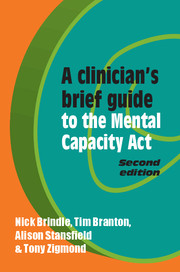Book contents
- Frontmatter
- Contents
- Preface
- Preface to the second edition
- Common abbreviations and terms
- 1 The legal framework: the Mental Capacity Act, the Human Rights Act and common law
- 2 The Mental Capacity Act and the authority to treat
- 3 Assessment of capacity
- 4 Best interests
- 5 Alternative authority – planning for the future
- 6 Independent Mental Capacity Advocates and regulation of research
- 7 Deprivation of Liberty Safeguards
- 8 The Court of Protection, clinically relevant judgments from the courts and writing reports
- 9 The Mental Health Act
- References
- Index
7 - Deprivation of Liberty Safeguards
Published online by Cambridge University Press: 01 January 2018
- Frontmatter
- Contents
- Preface
- Preface to the second edition
- Common abbreviations and terms
- 1 The legal framework: the Mental Capacity Act, the Human Rights Act and common law
- 2 The Mental Capacity Act and the authority to treat
- 3 Assessment of capacity
- 4 Best interests
- 5 Alternative authority – planning for the future
- 6 Independent Mental Capacity Advocates and regulation of research
- 7 Deprivation of Liberty Safeguards
- 8 The Court of Protection, clinically relevant judgments from the courts and writing reports
- 9 The Mental Health Act
- References
- Index
Summary
Deprivation of liberty
The MCA, as described so far, makes it clear that it cannot authorise a person to be deprived of their liberty. In April 2008, the Deprivation of Liberty Safeguards (DoLS) were added to the MCA. The purpose was to resolve the incompatibility between English and Welsh law and European law established by the European Court of Human Rights case known as ‘Bournewood’ (more properly HL v United Kingdom). The DoLS provide a procedure for authorising deprivation of liberty, as required by Article 5 of the European Convention on Human Rights, in particular situations:
‣ where an individual, 18 years of age or over, suffers from a mental disorder and lacks the capacity to consent to care or treatment, and
‣ the circumstances of their care within a care home or hospital amount to deprivation of liberty, and
‣ this deprivation of liberty is deemed necessary in their best interests.
Notes
‣ The MCA applies to people aged 16 and over, but the DoLS provisions apply only to those aged 18 and over. This is because the Children Act 1989 can be used to authorise deprivation of liberty for those under 18.
‣ DoLS cannot be used to deprive a person of their liberty in their own home. Only the Court of Protection can authorise this. This includes people in supported living arrangements where they have a tenancy agreement.
The DoLS provisions provide an additional legal framework that affords greater protection for mentally incapacitated people who require a high level of care, whether in hospital or elsewhere, but who fall outside the scope of the MHA. The DoLS scheme authorises detention in a range of situations and for a variety of purposes. However, the first consideration is what constitutes a deprivation of someone's liberty? The previous edition of this book discussed in some detail how case law had developed to inform the factors that clinicians and others must consider in order to recognise, and if possible prevent, deprivation of liberty. There was no statutory definition of the concept and, although there was guidance in the DoLS Code of Practice, the emergent cases were unable to resolve the ambiguity.
- Type
- Chapter
- Information
- A Clinician's Brief Guide to the Mental Capacity Act , pp. 72 - 88Publisher: Royal College of PsychiatristsPrint publication year: 2015

